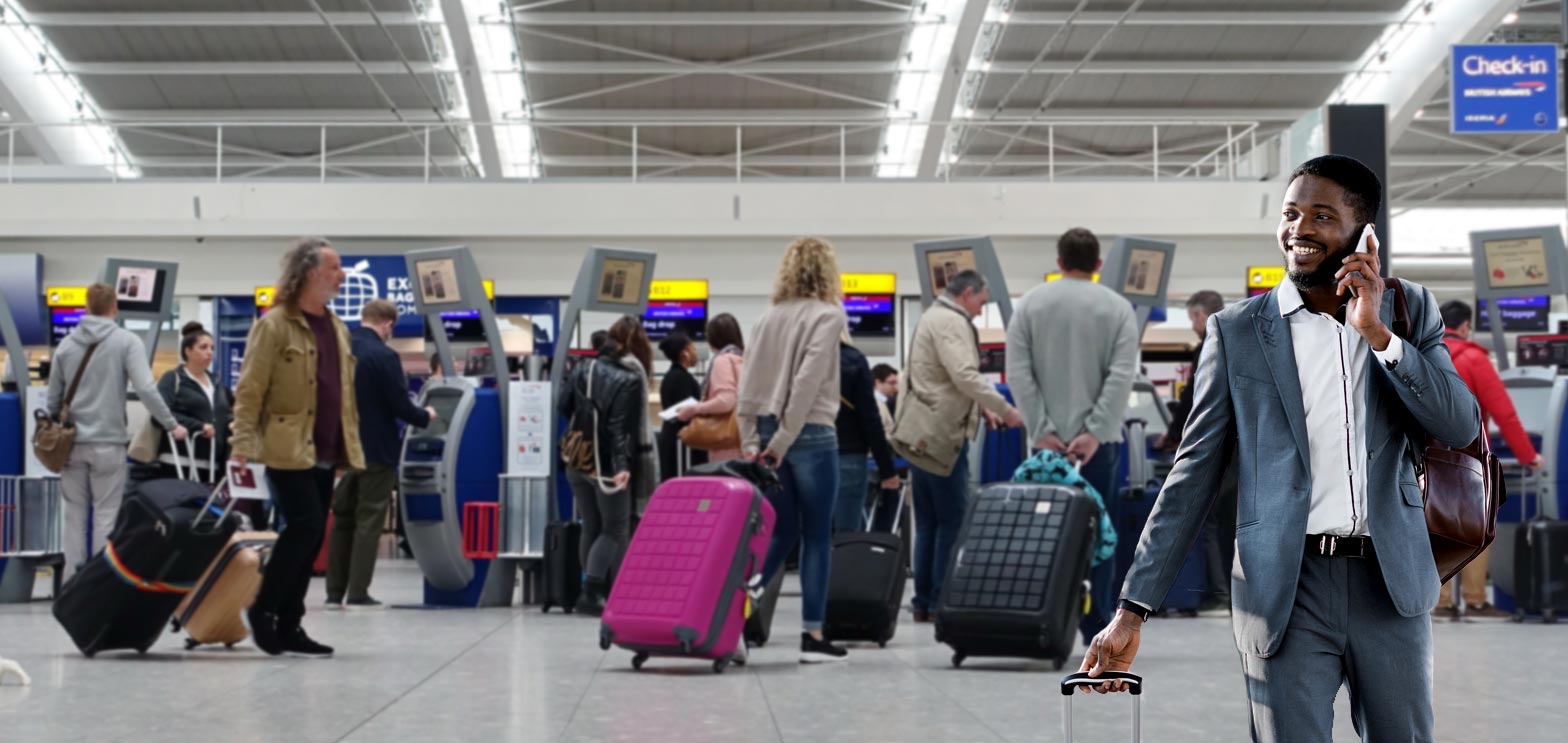Call Center Outsourcing5-minute read
Here Comes the High Season: Travel Industry Customer Service Tips for 2019
If you work in travel and hospitality, the time you have to prepare for the busiest parts of the year can be measured in months, and, more realistically, in weeks.

The reality is that most people planning to travel this summer have already started to book their reservations. If you haven’t already scaled up to meet this demand, it’s time to do so. And even if you have, are you sure that your preparations are in line with the travel industry customer care service standards of 2019?
As a leading provider of travel industry customer care solutions for more than 20 years, we’ve weathered our share of busy travel seasons. With that in mind, we’ve assembled this list of travel industry customer service tips to help you prepare for the busiest parts of 2019, and beyond.
7 Essential Travel Industry Customer Service Tips for 2019
1. More Convenience, More Customers. In this respect, the travel industry is like any other: Customers expect more convenience and faster service than ever before, and they’re fully prepared to jump ship to the competition if they don’t get it.

Customers expect more convenience and faster service than ever before.
Source: www.shutterstock.com.
That much may seem obvious, but there’s another aspect to this, too: Travel companies that provide greater convenience can potentially gain more customers, and even move into a higher price point, too: “Customers will do more business with the companies that are easiest to work with,” writes Shep Hyken for Forbes. “And they may even pay more—a lot more.” For an industry with travel’s potential for luxury and vacation spending, that’s a powerful motivator to invest in a superior customer experience.
2. Social Media Is the Preferred Communications Channel for Travelers. Coming hot on the heels of expectations for convenience is the fact that many customers turn first to social media when they want to ask you a question—or, unfortunately, to complain about something. And to do this, they’re going to want access to your customer care team via channels like Facebook Messenger or, if you do any business outside of the U.S., WhatsApp, which is enormously popular in pretty much every other country.

Many customers turn first to social media when they want to ask you a question—or, unfortunately, to complain about something.
Source: www.shutterstock.com.
It’s also important to constantly monitor your social media channels. Think of how often an altercation on a plane has blown up on Twitter, instantly seen by millions of people before a company’s executive team has any idea of what’s going on. There’s a real need to use agents skilled at responding to social media inquiries and complaints in 2019—for customer convenience, and for the chance to get ahead of potential crises before they do actual damage.
3. Automated Information Is a Necessity. But as important as it is to have a robust presence on social media, it’s not enough. A huge proportion of travel queries are fairly run-of-the-mill questions that can be answered by quickly consulting an FAQ page or automated status report, with no need for direct contact.

A huge proportion of travel queries are fairly run-of-the-mill questions that can be answered by quickly consulting an FAQ page or automated status report.
Source: www.shutterstock.com.
Will the snowstorm in Chicago affect my flight to New York? And if my flight is late, can I still get shuttle service from the hotel? For the answers to questions like these, most customers turn first to your website, and there’s no reason to deny them fast answers via either static information (like opening hours or shuttle policy) or a widget that offers up-to-date flight tracker information.
4. Fast Access to a Live Agent Is More Important than Ever. So social media is the preferred channel for many customers in many instances, while automated information is essential for meeting basic travel inquiries. But make no mistake—there are still plenty of travel situations where access to a live agent is absolutely essential for delivering a swift resolution to a complex problem.

There are still plenty of travel situations where access to a live agent is absolutely essential.
Source: www.shutterstock.com.
Particularly when snowed in at an airport or stuck at a hotel lobby with a lost reservation, customers need to speak to someone who can help them with their dilemma. And they want to do so quickly, without having to wait 30, 20, even 10 minutes being shuffled from agent to agent before they do so.
5. Agent Specialization and Expertise Are Key to Customer Satisfaction. The proliferation of travel websites over the past decade has empowered customers to do a great deal of their own travel bookings, with no need for direct interaction with your business at all. So when customers do reach out to you—and especially when they actually pick up the phone and call you—it’s important to offer them a level of service that can readily meet whatever requests they may have.

It’s important to offer them a level of service that can readily meet whatever requests they may have.
Source: www.shutterstock.com.
More than in other industries, then, there’s a real need for customer care agents working in travel and hospitality services to offer expertise in industry-specific matters like legacy airlines reservations and global distribution systems. They may even be called upon to offer unconventional, off-the-cuff travel tips like differentiating between two hotels, or offering an explanation as to why one flight is more expensive than another.
6. Personalization Rules the Game. It’s true that customers have a negative reaction to their personal data being shared between companies without their express consent. But on the other side of that coin, they’ve also been shown to react positively when a company leverages their information to offer personalized offers, such as exclusive access to products and services they’ve shown interest in. According to Salesforce.com, 59% of customers say they prefer “tailored engagement based on past interactions.”
“59% of customers say they prefer “tailored engagement based on past interactions.”” Click To Tweet
Here, again, the travel industry has a unique opportunity to achieve this goal using social media. According to SimpliFlying, a UK-based travel marketing firm, the “future lies in ensuring that airlines can use social media data and convert them into actionable insights that will yield closer relationships with customers”—via, you guessed it, increased personalization.
7. The Smart Use of Data Can Facilitate All of the Above. To achieve this personalization—as well as all the other points on this list—more and more customer service teams in the travel industry are leveraging the smart use of customer data, as well as the application of advanced analytics to make the best possible use of it.

Customer service teams in the travel industry are leveraging the use of customer data, and advanced analytics to make the best possible use of it.
Source: www.shutterstock.com.
Hyken writes: “People are impressed with how the companies they do business with seem to know them. The ability to use data to analyze buying patterns, and then use that to properly promote or provide a customized experience, is getting easier.”
Using these methods, he argues, means travel companies can do “a better job of segmenting their customers into groups (also known as personas) to provide a more personalized experience.”
Facing the Challenges of Travel Industry Customer Service in 2019
We’ll be the first to admit it: As the standards for customer care continue to rise, it’s becoming more difficult to deliver a truly satisfying travel industry customer service experience that effectively hits all the points listed here.
This isn’t helped by the fact that customer service agents with real expertise in the travel industry are getting pretty hard to come by—and those who are available come with a (deservedly) high price tag. The kind of skills that today’s travel customer service agents need to have are simply no longer commonplace, which is a major reason why many businesses offering travel and hospitality services are turning to on-demand customer care providers to fill this need.
Deep Dive: How to Improve the Travel Customer Experience with On-Demand Call Center Solutions
With more than 20 years of experience as a provider of outsourced customer care solutions—and an enormous range of expertise in the travel industry—Working Solutions has not only mastered the secrets of effectively managing travel and hospitality call centers, but has the resources to constantly adapt to meet the continuously evolving needs of a demanding customer base.
If you’re struggling with the prospect of delivering truly effective travel industry customer service, we’re standing by to help.

Contact us today to schedule your complimentary consultation with a Working Solutions expert and discover how we can help take your business to new heights.
Let's connect.
This Might Interest You...
This website uses cookies to personalize and improve your experience. Continue browsing our site if you agree to our Cookie Policy or feel free to Manage Cookies yourself.


